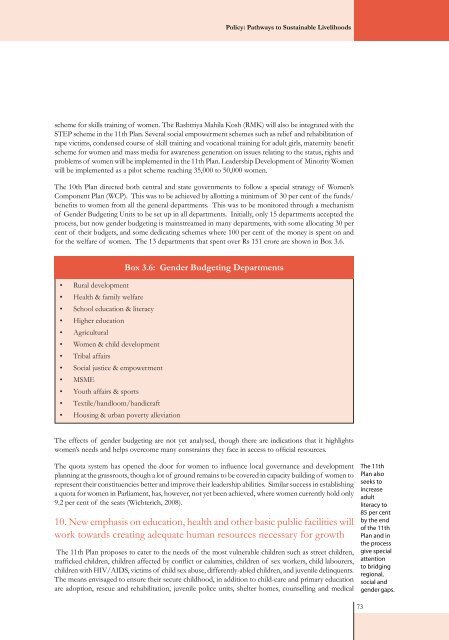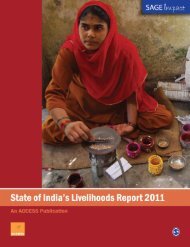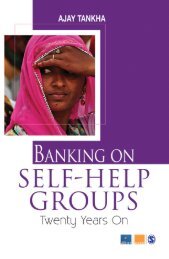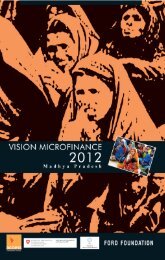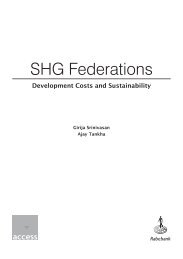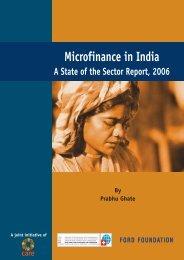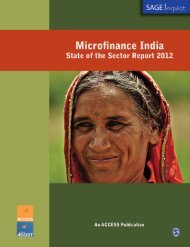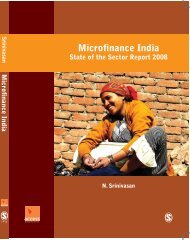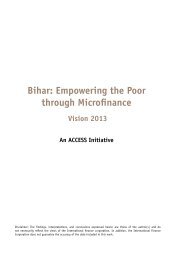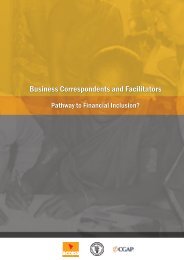Chapter III9. The achievement of gender and caste equality is considered a crosscuttingtheme to be mainstreamed in all sectoral development policiesIn India, the advancement of women has been aimed at in different spheres, within the framework ofthe democratic polity, and the conceptualisation of empowerment has been refined since the 5th Five-Year Plan. The dimensions of power, which are not specifically considered under the 10th Plan butare important in the context of women’s empowerment in India, relate to their collectivisation, greaterparticipation in political processes, especially panchayati raj institutions (PRIs) as the most importantgrassroots institutions. Another aspect not mentioned in the 10th Plan but needs to be highlighted whileelaborating the concept of empowerment relates to cultural parameters, e.g. respect of rights of indigenouspeople and inclusion of their knowledge and practices. An important caution in dealing with women’sempowerment, and women’s issues in general, is to be able to allow for diversity, and the representationof multiple views and interests, thereby not treating ‘women’ as one monolithic category, but allowingfor the preferences of different castes, ethnic groups and classes to be articulated.The 11thPlan endorsesall the areasemphasisedin the 10thPlan and hasexpandedthe conceptfurther, buthighlightedthree keyelements ofgender equity– women asdiversifiedgroups forplannedintervention,inclusivedevelopment,and a fiveprongedinterventionfor womenfor sustainedlong-termimpact.‘Empowerment of Women’ as agents of social change and development was continued in the 10thPlan. Towards this a sector-specific three-fold strategy based on Social Empowerment, EconomicEmpowerment and Gender Justice was adopted based on the National Policy for Empowerment ofWomen. This approach was criticised for its omission of cultural aspects, and a more elaborate view ofempowerment, which accounts for views of CSOs. This also needs to be revised to account for thesynergies between different aspects of empowerment. The 11th Plan endorses all the areas emphasisedin the 10th Plan and has expanded the concept further, but highlighted three key elements of genderequity – women as diversified groups for planned intervention, inclusive development, and a five-prongedintervention for women for sustained long-term impact. The last aims toa. provide women with basic entitlements;b. address the reality of globalisation and its impact on women;c. ensure an environment free from all forms of violence against women;d. ensure the participation and adequate representation of women at the highest policy levels, particularlyin Parliament and Assemblies;e. strengthen existing institutional mechanisms and create new ones for gender mainstreaming andeffective policy implementation.This has also led to the 11th Plan widening the basic strategy net for women’s empowerment- economicempowerment through employment, social empowerment and engendering social change; politicalempowerment; strengthening mechanisms for effective implementation of women-related legislations;and creating institutional mechanisms for gender mainstreaming and strengthening delivery mechanismsfor effective implementation of women-related programmes, by strengthening the Women‘s ComponentPlan (WCP), and universalising gender budgeting and gender outcome assessment in all ministries/departments at the Centre and the states.72The 11th Plan has prioritised engendering of national policies, tackling the issue of food security, andaddressing the issue of globalisation, and its impact on women, especially those who are most marginalised.It seeks to curb the increasing violence against women, and ring in an era of zero tolerance for castebaseddiscrimination against SC/STs and women. It also claims to support, strengthen, and qualitativelyimprove the microcredit regime in favour of women, based upon a comprehensive national-level reviewof SHGs and microcredit policies from a gender perspective.72These ambitious plans are to be achieved by continuing some old schemes and launching many new ones.The major lessons from Swayamsidha and the first phase of Swashakti will be integrated into STEP, a
Policy: Pathways to Sustainable Livelihoodsscheme for skills training of women. The Rashtriya Mahila Kosh (RMK) will also be integrated with theSTEP scheme in the 11th Plan. Several social empowerment schemes such as relief and rehabilitation ofrape victims, condensed course of skill training and vocational training for adult girls, maternity benefitscheme for women and mass media for awareness generation on issues relating to the status, rights andproblems of women will be implemented in the 11th Plan. Leadership <strong>Development</strong> of Minority Womenwill be implemented as a pilot scheme reaching 35,000 to 50,000 women.The 10th Plan directed both central and state governments to follow a special strategy of Women’sComponent Plan (WCP). This was to be achieved by allotting a minimum of 30 per cent of the funds/benefits to women from all the general departments. This was to be monitored through a mechanismof Gender Budgeting Units to be set up in all departments. Initially, only 15 departments accepted theprocess, but now gender budgeting is mainstreamed in many departments, with some allocating 30 percent of their budgets, and some dedicating schemes where 100 per cent of the money is spent on andfor the welfare of women. The 13 departments that spent over Rs 151 crore are shown in Box 3.6.Box 3.6: Gender Budgeting Departments• Rural development• Health & family welfare• School education & literacy• Higher education• Agricultural• Women & child development• Tribal affairs• Social justice & empowerment• MSME• Youth affairs & sports• Textile/handloom/handicraft• Housing & urban poverty alleviationThe effects of gender budgeting are not yet analysed, though there are indications that it highlightswomen’s needs and helps overcome many constraints they face in access to official resources.The quota system has opened the door for women to influence local governance and developmentplanning at the grassroots, though a lot of ground remains to be covered in capacity building of women torepresent their constituencies better and improve their leadership abilities. Similar success in establishinga quota for women in Parliament, has, however, not yet been achieved, where women currently hold only9.2 per cent of the seats (Wichterich, <strong>2008</strong>).10. New emphasis on education, health and other basic public facilities willwork towards creating adequate human resources necessary for growthThe 11th Plan proposes to cater to the needs of the most vulnerable children such as street children,trafficked children, children affected by conflict or calamities, children of sex workers, child labourers,children with HIV/AIDS, victims of child sex abuse, differently-abled children, and juvenile delinquents.The means envisaged to ensure their secure childhood, in addition to child-care and primary educationare adoption, rescue and rehabilitation, juvenile police units, shelter homes, counselling and medicalThe 11thPlan alsoseeks toincreaseadultliteracy to85 per centby the endof the 11thPlan and inthe processgive specialattentionto bridgingregional,social andgender gaps.73
- Page 3 and 4:
State of India’s Livelihoods :The
- Page 5 and 6:
ChapterPage NoForeword 6Preface 8Ab
- Page 8:
ForewordAs a part of its microfinan
- Page 11 and 12:
employment growth, these sectors we
- Page 14:
RIAARMKRRBRSVYSCSC/STsSCPSCSPSERPSE
- Page 20 and 21:
Chapter Iresponse, risks and shocks
- Page 23 and 24: OverviewTable 1.2 Employment and Un
- Page 25 and 26: OverviewA recent paper by Arjun Sen
- Page 27: Overview4. How is the livelihood st
- Page 31 and 32: Overview5.2 Manmade constraints - i
- Page 33 and 34: Overviewthe late 1980s, these two m
- Page 35 and 36: OverviewIn the 1970s, the Chipko mo
- Page 37 and 38: Overviewsocial responsibility (CSR)
- Page 39 and 40: OverviewBox 1.3 Bihar - Underdevelo
- Page 42 and 43: 4040
- Page 44 and 45: Chapter IIAn enumeration of the dep
- Page 46 and 47: Chapter IIBox 2.1 Macro Level Livel
- Page 48 and 49: Chapter IIIn addition to the above,
- Page 50 and 51: Chapter IIFig 2.1: Poverty Ratio am
- Page 52 and 53: Chapter IIPoormigrantlabouroften su
- Page 54 and 55: Chapter IIInterestingly, the Govern
- Page 56 and 57: Chapter IIThe effective cost of nat
- Page 58 and 59: Chapter IIsector and thereby casual
- Page 60 and 61: Chapter IIReferences1. Aiyar , Swam
- Page 62 and 63: Chapter IIIto, the vulnerability co
- Page 64 and 65: Chapter IIIIt would be useful here
- Page 66 and 67: Chapter IIIof new employment opport
- Page 68 and 69: Chapter IIIinterest subvention - wo
- Page 70 and 71: Chapter III6. The 11th Plan propose
- Page 72 and 73: Chapter IIIBox 3.5: Rural Business
- Page 76 and 77: Chapter IIIaid. The Plan also seeks
- Page 78 and 79: Chapter IIIand health. They point o
- Page 80 and 81: Chapter IIIReferences1. Ambasta, Pr
- Page 82 and 83: 8080
- Page 84 and 85: Chapter IVtransport, storage, commu
- Page 86 and 87: Chapter IVing of ‘English Speakin
- Page 88 and 89: Chapter IVWhile these livelihoods h
- Page 90 and 91: Chapter IVTable 4.6 Employment with
- Page 92 and 93: Chapter IVConstruction requires no
- Page 94 and 95: Chapter IVgains in manufacturing ha
- Page 96 and 97: Chapter IV10. A Spatial Perspective
- Page 98 and 99: Chapter IVA quick glance at some of
- Page 100 and 101: Chapter IV12. Once a watershed is d
- Page 102: Chapter IVThrougha range ofschemes
- Page 105 and 106: Public Systems: Major central gover
- Page 107 and 108: Public Systems: Major central gover
- Page 109 and 110: Public Systems: Major central gover
- Page 111 and 112: Public Systems: Major central gover
- Page 113 and 114: Public Systems: Major central gover
- Page 115 and 116: Public Systems: Major central gover
- Page 117 and 118: Public Systems: Major central gover
- Page 119 and 120: Public Systems: Major central gover
- Page 121 and 122: Public Systems: Major central gover
- Page 123 and 124: Public Systems: Major central gover
- Page 125 and 126:
Public Systems: Major central gover
- Page 127 and 128:
Public Systems: Major central gover
- Page 129 and 130:
Public Systems: Major central gover
- Page 131 and 132:
Public Systems: Major central gover
- Page 133 and 134:
Civil Society InitiativesChapter VI
- Page 135 and 136:
Civil Society InitiativesThe human
- Page 137 and 138:
Civil Society Initiativesso far has
- Page 139 and 140:
Civil Society Initiativesan 8 per c
- Page 141 and 142:
Civil Society InitiativesThe cooper
- Page 143 and 144:
Civil Society Initiativeslimited ir
- Page 145 and 146:
Civil Society Initiativesintelligen
- Page 147 and 148:
Civil Society InitiativesOutboard M
- Page 149 and 150:
Civil Society InitiativesCase Study
- Page 151 and 152:
Civil Society InitiativesReferences
- Page 153 and 154:
The Contribution of Corporate Suppl
- Page 155 and 156:
The Contribution of Corporate Suppl
- Page 157 and 158:
The Contribution of Corporate Suppl
- Page 159 and 160:
The Contribution of Corporate Suppl
- Page 161 and 162:
The Contribution of Corporate Suppl
- Page 163 and 164:
The Contribution of Corporate Suppl
- Page 165 and 166:
The Contribution of Corporate Suppl
- Page 167 and 168:
The Contribution of Corporate Suppl
- Page 169 and 170:
The Contribution of Corporate Suppl
- Page 172 and 173:
Chapter VIII170
- Page 174 and 175:
Chapter VIIIcountry that make the e
- Page 176 and 177:
Chapter VIIIFig 8.4: All-India area
- Page 178 and 179:
Chapter VIIIWhen commercial crops l
- Page 180 and 181:
Chapter VIIIunit of risk settlement
- Page 182 and 183:
Chapter VIIIPublic capitalformation
- Page 184 and 185:
Chapter VIII8. Integrated Rural Dev
- Page 186 and 187:
Chapter VIIIAn expertpanel ‘sreco
- Page 188 and 189:
Chapter VIIIHowever as final wage s
- Page 190:
188
- Page 193 and 194:
appENDIX TableTable A.1.3: Distribu
- Page 195 and 196:
appENDIX TableEmploymentEmploymentG
- Page 197 and 198:
appENDIX TableTable 2: Employment S
- Page 199 and 200:
appENDIX TableTable 4: State Wise G
- Page 201 and 202:
appENDIX TableTable-7: Distribution
- Page 203 and 204:
appENDIX TableDams and Displacement
- Page 205 and 206:
appENDIX TableFig. A.3.2: High Pote
- Page 207 and 208:
appENDIX TableTable A.3.2Table 2: S
- Page 209 and 210:
appENDIX TableChapter IV - ANNEX TA
- Page 211 and 212:
appENDIX TableAnnex A.5.1Backward R
- Page 213 and 214:
appENDIX TableAnnex A.5.3Some UNDP
- Page 215 and 216:
appENDIX TableGross Value of Output
- Page 217 and 218:
Mona DikshitMona Dikshit has been a


